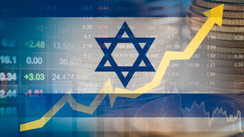Stock Index Futures embody contracts between investors that fundamentally speculate on the future changes in the price of a stock index. These changes are gauged in terms of index points, which are settled on a pre-agreed date specified in the contract.
Consider a hypothetical scenario where Joe sells an MES (Micro E-mini S&P 500 Futures) contract to Ann. This contract is valued at $5 per index point. The S&P 500's trading value on the contract date stood at 4,100, whereas on the settlement day, it was 4,101. Despite the likely volatility of the S&P 500 in the intervening period, Ann is obliged to pay Joe $5 on the settlement date.
Understanding How Stock Index Futures Operate
At the very core of stock index futures is their classification as derivatives. This distinction implies a significant feature of these financial instruments - there's no physical transaction of stocks. Rather, the entire process unfolds in the realm of contractual obligations between the buyer and seller. This contract is a binding agreement with conditions that are particular to that specific deal.
In traditional stock trading, buying stocks typically necessitates acquiring them in large batches, termed as 'lots'. This conventional trading approach can lead to substantial capital involvement, making it a rather expensive operation. However, this norm is circumvented in the case of stock index futures. Here, there's no obligation to buy lots, which significantly curtails the overall cost.
- Generally, stock index futures see active trading on the Chicago Mercantile Exchange Globex platform. Access to this trading platform is broker-dependent, meaning that you would need to ensure your broker extends support for index futures trading.
In the trading ecosystem of stock index futures, each party involved in the contract must allocate a specific sum, known as a 'margin,' to a broker. This margin serves as a form of security deposit, necessary for upholding the futures contracts.
At the inception of the contract, the buyer and seller mutually agree to shoulder the cost differential of the index movement. This difference is calculated from the day the contract was established until the agreed settlement date. Essentially, the investors are not betting on the index's total value but on the fluctuations in the index that could occur during the life of the contract. This aspect introduces a dynamic element to futures trading, making it a continually evolving landscape.
A variety of index futures are available for trading in the United States. Here are the specifications for each of these contracts:
| INDEX | TICKER | E-MINI CONTRACT SIZE | MICRO E-MINI CONTRACT SIZE |
|---|---|---|---|
| NASDAQ 100 | MNQ | $20 x Nasdaq 100 | $2 x Nasdaq 100 |
| S&P 500 | MES | $50 x S&P 500 | $5 x S&P 500 |
| RUSSELL 2000 | M2K | $50 x Russell 2000 | $5 x Russell 2000 |
| DOW JONES | MYM | $5 x Dow Jones | $.50 x Dow Jones |
Additionally, the Chicago Mercantile Exchange Group offers international index futures, as well as futures for specific sectors such as utilities, healthcare, and communication services. These offerings further expand the trading scope, providing investors with diverse avenues for financial growth. Thus, understanding the intricate functioning of stock index futures can pave the way for informed trading decisions, potentially leading to profitable outcomes.
Implications for Individual Investors
Investing in index futures enables individuals to assume short or long positions on a multitude of stocks at a significantly reduced cost and time. Despite the leveraging, trading in index futures allows for more efficient utilization of capital.
- Due to the futures market operating almost round-the-clock for six days a week, there's a risk of overtrading or acting impulsively, deviating from your intended strategy.
The inherent risks in index futures mirror those in any futures trading—predicting the trajectory of the markets and indexes at the expiration of the contracts is impossible. Depending on the trading volume, you might face difficulties in closing a position, and your stop and market orders may fail to execute.
Advantages and Disadvantages of Stock Index Futures
Pros Expanded
The primary benefits of futures revolve around cost and speculative potential:
- Speculative opportunities: Index futures facilitate speculation on future stock prices with increased leverage. They grant access to 24/7 securities trading in well-regulated markets without the need to own the stocks that the futures contract tracks.
- Trading costs: Purchasing stock index futures contracts entails spending significantly less than the stated price for the stocks that the futures contract tracks.
Cons Expanded
The potential downsides of futures trading pertain to high risk and cash reserves:
- Leverage risks: The major risk associated with index futures investing involves the potential for substantial losses if market conditions shift unfavorably.
- Cash and margins: Participating in futures trades necessitates maintaining cash in a margin account. Failing to do so may result in a "margin call," compelling you to replenish it. A lack of funds to maintain the margin account can lead to steep debt and potential loss of personal assets.
Are Stock Index Futures a Viable Investment Option?
Despite potential fees and margin account maintenance, stock index futures present the opportunity to trade an entire index of stocks at a substantially reduced cost. If you have a high risk tolerance and enjoy trading, it could be a lucrative investment approach.
However, it's prudent to seek advice from an investment advisor or another seasoned financial professional before venturing into stock index futures. Their objective guidance can help you make informed and responsible investment decisions.
In essence, stock index futures are legally binding agreements to buy or sell a stock index at a predetermined price on a future date.
Key Takeaways
- Stock index futures are legally binding agreements to purchase or sell contracts at a specified price on a future date.
- Stock index futures enable investors to speculate on future prices, albeit with considerable risk in case of swift price changes.
- Stock index futures provide trading access to an entire index's stocks at a significantly reduced cost.
- Stock index futures are available for major U.S. indexes, certain international indexes, and sector-specific indexes.
Pros
- Opportunity to speculate on future prices without owning the stocks on the index.
- Potential to earn a considerable sum with minimal capital.
Cons
- Leverage may lead to losing the entire investment if the trade goes awry.
- Cash is necessary in margin accounts to cater to possible margin calls.





